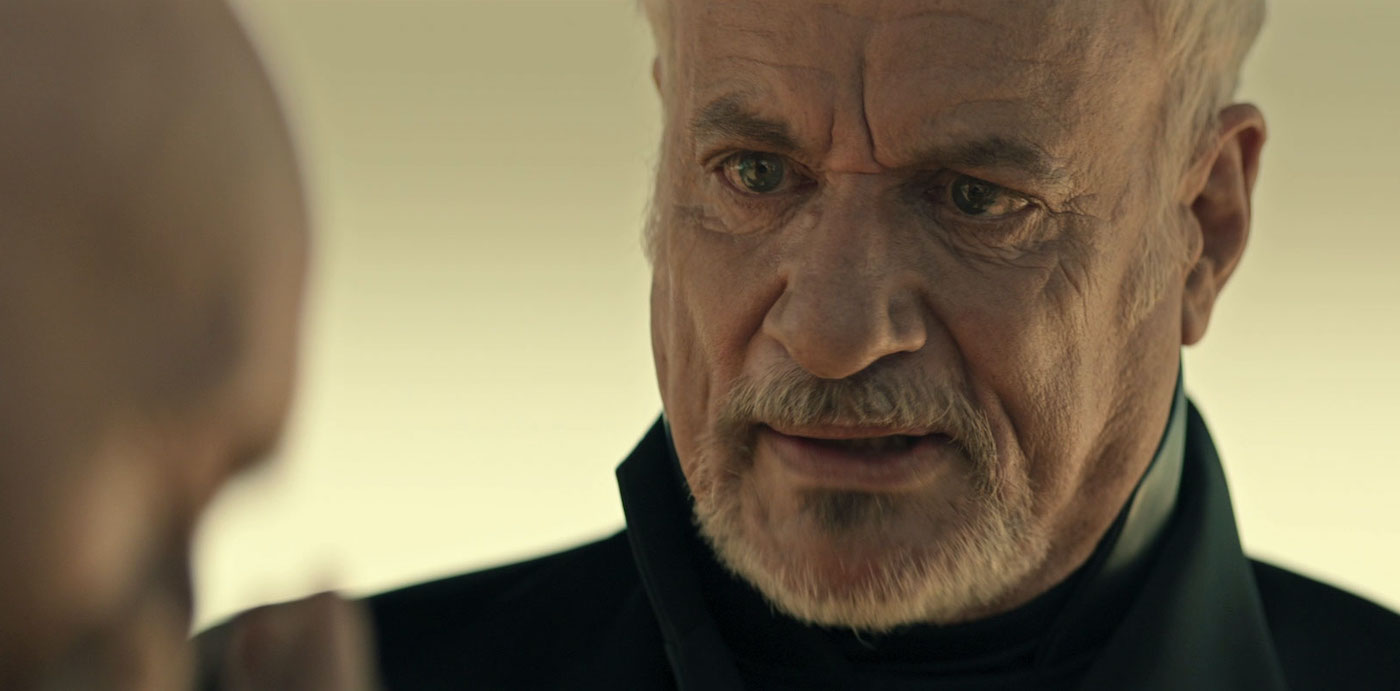“The chase is dying in your arms. And I am but a suture in the wound.”
Few experiences in all of Star Trek: Picard are more clarifying than seeing John De Lancie return to the role of Q in “Penance.” De Lancie smacks the cover off the ball; the ball clears the far wall and shatters the stadium lights. More so than Pizza Riker in “Nepenthe;” more so than Spiner’s death scene in “Et In Arcadia Ego Part Two.” And — critically — De Lancie succeeds at a level that utterly hobbles Patrick Stewart’s dinner-theatre recapitulation of Jean-Luc Picard, permanently; and by extension, kneecaps the entire series. In a single speech in the first five minutes of “Penance,” De Lancie fully revives the best of Star Trek: The Next Generation; and in so doing, handily demonstrates why Picard can never — and does never — measure up.
De Lancie is 73 when he returns to the role of Q in season 2 of Picard. The series nicely does away with the age differential (something the show becomes amusingly adroit at, over time) by having Q “catch up” to Picard, after a couple of shots of de-aging; Q always had a thing for dressing up like his favourite pet. De Lancie has played Q twelve times before now (not counting various video games and voice roles), the majority on Star Trek: The Next Generation, although the character’s three appearances on Voyager are, for that series anyway, remarkably good. The Q episode, as a storytelling mode, became a critical staple of Next Gen‘s success; once a year or thereabouts, the character would turn up and open the doors of Chaos upon the world-weary Enterprise crew. It was a useful (and, in most instances, successful) disruption to the otherwise more stolid weekly adventures on the 1701-D. It let the cast play comedy; but perhaps more importantly, the Q episodes also let the series address some of its thematic architecture directly: what is so special about humanity, anyway? What is Roddenberry getting at with his vision of an evolved human race in the 24th century? What have we figured out, and how do we know we’ve figured it out, to separate us from the childish beasts that Q repeatedly accuses us of (still) being?
In the years between Next Gen and Picard, De Lancie has committed at least one other performance of substantial note, as Donald Margolis — Jane’s father — in the second season of Breaking Bad. A small role, De Lancie is nonetheless piercingly effective in it; his emotional and psychological breakdown in the second-season finale supplies the critical detail for the season-long disaster that has unfolded up till then in shots and references. Margolis (an air traffic controller, working an inadvisable shift after his daughter has died) accidentally causes an airplane disaster. On Star Trek, De Lancie (by necessity) was broad, grandiose; on Breaking Bad, he’s almost painfully small and internal.
In flashes and beats, De Lancie brings both aspects to his performance in “Penance,” and it’s magnificent. Even Picard notices it: something is wrong with Q. He’s not the usual level of self-aggrandizing, above-it-all charlatan. Q is angry; petulant. He’s done this too many times.
Q has flung the La Sirena gang into an alternate reality where… well, it’s honestly not worth even going into. Nothing in “Penance,” or the rest of season two, lives up to the cataclysmic rage that Q brings down upon Picard in the first five minutes of this episode. In hindsight, it broke the show for me. I don’t think Picard ever recovers from the megaton blast that seems to present itself at the top of “Penance,” even if it takes episodes and episodes more to really prove how disastrously the creative team has fumbled the bag. The rest of this episode is awful — visually, thematically, narratively; and it features Stewart’s worst performance yet, as (our) Picard playing (their) Picard, who is (in this timeline) an evil dystopian despot. It’s as if Stewart has simply lost the ability to play two things at once; and when a character is pretending to be a different character, one who has personally murdered Gul Dukat, Sarek and General Martok, playing two things at once is kind of the whole game. But no: we’re back in the mode of French Accent Picard; Dinner Theatre Picard. Pantomime Picard. It’s awful.
Honestly, if you stopped watching Picard right here, you’d be making the right move, and Q would probably cheer you on. He’s not wrong: his little pet has turned out to be a galactic disappointment, and we’ve all done this already too many times.
Blogging the Next Generation: Picard runs Thursdays on tederick.com as I work my way through every episode of Star Trek: Picard. The original BTNG did the same for Star Trek: The Next Generation.
